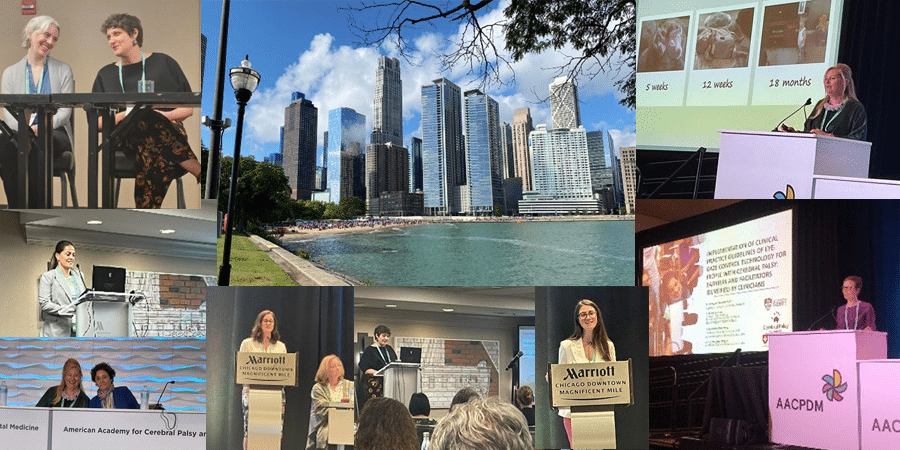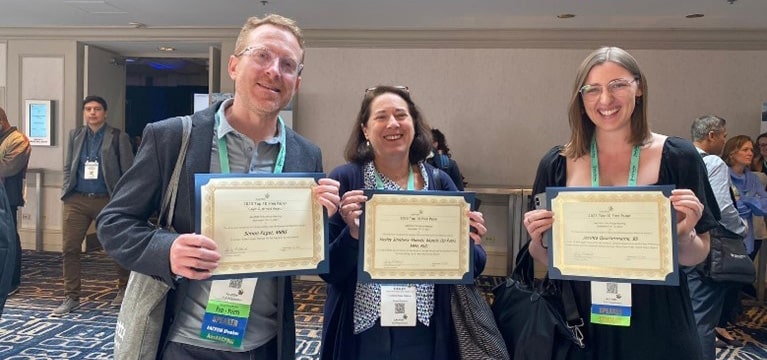
Not only did our researchers sweep up a number of accolades, but they were also keynote speakers on several forum panels and conducted over 11 presentations – spearheading the Cerebral Palsy Alliance Research Foundation as leaders in global research.
More than 1,100 researchers, clinicians and medical professionals were in attendance at the conference, including sixteen CPA researchers. They represented our four research priorities – early detection & intervention, epidemiology, technology and regenerative medicine.
“Our research results were of great interest to the global specialists at this conference and our team was widely sought out. We were frequently asked why Australia was leading the way,” said Nadia Badawi, Chair, Cerebral Palsy Alliance Research Foundation.
“Our successes; 40% drop in the rate of CP in Australia since 2006, reduction in severity, early diagnosis and childhood intervention, the Australian CP register, along with current project updates really reinforced our position as global leaders. Our results ensured robust discussion and debate with current and potential collaborators,” added Professor Badawi.
The conference theme, Winds of Hope, was reflected throughout the four days of learning, collaboration and networking.
Echoing Cerebral Palsy Alliance’s ethos of taking guidance from those with lived CP experience, the conference opened with a Community Forum, an in-person educational event developed by families to serve as a resource for individuals with cerebral palsy and their parents and carers.
Professor Iona Novak was a panellist at the forum, discussing stem cells in a “Hot Topics” panel. She also delivered a powerful keynote presentation during the main conference. Drawing on the experiences of families that have been involved with her research, her talk was titled “An early diagnosis is better, even if it is hard to accept”.
Over the course of the conference, our CPA researchers presented eleven oral presentations, spanning topics from epidemiology to feeding therapy for babies, from umbilical cord blood treatment to genetics studies and eye-gaze technology. There was vast audience interest in a landmark paper regarding the accuracy of early markers to predict motor severity and type of cerebral palsy in infants, presented by Dr Anna te Velde.
CPA hosted six mini-symposiums and seminars during the conference. These longer sessions facilitated in-depth training, discussion and collaboration in topics such as the acceleration of clinical trials and research translation, task-specific training and using data to accelerate research discoveries.
In collaboration with researchers from the US and Europe, CPA researchers Dr Sarah McIntyre, Professor Nadia Badawi, and Dr Shona Goldsmith presented the first version of a new map of causal pathways to CP. This workshop generated much discussion and garnered a new group of collaborators to join the global project as it progresses.
There were multiple workshops and sessions across the conference that focused on technology, including Dr Petra Karlsson’s important symposium on using technology (switch and eye-gaze technology) to increase healthcare access by developing an accessible neuropsychological (brain testing) battery for individuals with severe motor and speech impairment. A second important seminar on the use of eye-gaze technology in children and youth with severe CP was also well-received by the audience. Our team were also able to attend an important pre-conference workshop that focused on a global perspective on technology use in rehabilitation, hosted at Northwestern University.
Notably our CPA researchers received five of the ten ‘Top 10 Free Paper nominations. Accolades included:
Evaluation of a Mindfulness Based Stress Reduction Intervention for Adults with Cerebral Palsy with Anxiety and/or Emotion Regulation Difficulties
Associate Professor Hayley Smithers-Sheedy was nominated for the Best Adult Paper

Other important research from low- and middle-income countries (LMIC) (including Argentina, Bangladesh, India, Mexico, Nigeria, Sri Lanka) was presented at the conference.
The research included a randomized controlled trial of parent-delivered early intervention, studies on early detection, epidemiology, and our survey of CP registers across the world including twelve new registers in LMIC.
The international impact and reach of CPA was evident throughout the conference, with CPA results underpinning a vast number of additional presentations, supported by CPA research funding.
Alongside robust discussion and debate through networking opportunities, several team members were able to capitalise on their proximity to other important events while in the US: Dr Anna te Velde and Dr Ashleigh Hines met with collaborators at the prominent Cincinnati Children’s Hospital, Dr Amanda Khamis met with collaborators and attended an infant feeding conference in Boston, while Dr Megan Finch-Edmondson presented at the 2023 Cord Blood Connect Conference in Florida, winning Best Abstract Award for her presentation.
An important future event that will be led by Conference Co-Chair and Academy Co-President Dr Sarah McIntyre and attended by our talented researchers, is the Australasian Academy of Cerebral Palsy and Developmental Medicine conference in Cairns in July 2024.